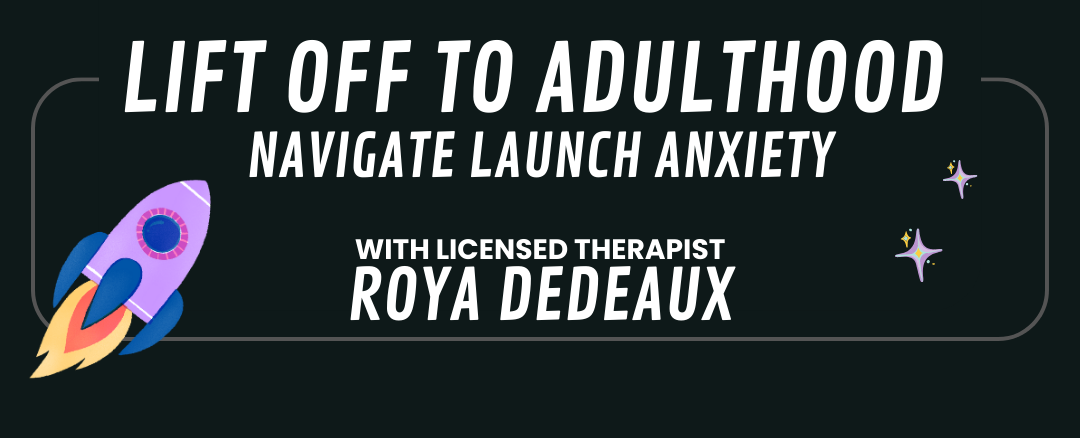How to Address your Teen’s Bad Behavior (without resorting to punishment)
Roya Dedeaux, MS, LMFT
Struggling to find constructive ways to address your teen's behavior without resorting to punishment? Read more!

I kid you not - I had started by pulling a thread, which led to tugging at some more fabric… and completely and totally unconsciously, I unraveled An Entire Couch.
It wasn’t malicious. It wasn’t on purpose. But was it okay? Not so much. Would most people believe me that I didn’t recognize at some point during those hours that what I was doing was destructive? Also not so much. But I promise you, everyone reading this, and my parents - I was completely oblivious to what I was doing until I hung the phone up and saw with non-distracted eyes.
There wasn’t a parenting book that told my folks how to handle it when their 15 year old accidentally destroyed property. There wasn’t really a guide that covered how to handle it when I decided at 2am to rip up my ugly orange carpet and glue tiny gemstones to my floor. Or when I decided to cover my dresser in stickers. Or do any number of pretty thoughtless things to our house, my room, my clothing, and my hair.
The teen years are tumultuous - we hear that word a lot. For parents AND teens it can feel like traveling uncharted waters. We’ve got the teenagers figuring themselves out - asserting independence and testing boundaries. We have the parents grappling for effective strategies to address challenging behaviors. There can be heightened feelings, more conflict, and the stakes feel so high. While punishment may seem like a quick and necessary fix, teenage-Roya and adult-therapist-Roya would like to remind you that there are more constructive approaches to handling your teen’s challenging behaviors.
These alternatives to punishment can foster deeper connections, enable much better communication, and help your teens learn and grow the way you really want them to.
1. First Things First: Work to Understand Teen Behavior
Okay so just so we are all on the same page - adolescence is a time of immense change. Remember how quickly your kids seemed to move through milestones when they were infants? One day they were teeny tiny humans, and the next they were walking and talking?
Becoming a teenager is so similar in the physical and emotional growth that is happening. Not to mention there are more external demands - such as the pressure of figuring out college, the stress of ever-changing friendship dynamics, and building the self-esteem to take on challenges like job interviews.
Parents - we need to remember that, just like when a toddler throws a temper tantrum, many “bad” behaviors exhibited by teens are expressions of underlying needs, emotions, or struggles.
It can be hard in the moment to remember that behavior is communication. But that really is our job as parents and as grown-ups. Take a step back from any situation and look for the subtext. In the case of Roya and the Couch That Didn’t Make It - the adult might recognize that that action communicated how important my relationships were, how deeply invested I could be – and how maybe a fidget toy or two would be a good thing.

2. Second Things Second: They Have to be Able to Talk to You
Understanding behavior has to come first, because there will be plenty of times you need to be truly, deeply empathetic in order to keep lines of communication open between you and your teenager.
If the root cause of their behavior has to do with anxiety, pressure, stress, fear, worry, confusion, doubt, grief, loss, anger… or any other scary negative emotion, they will need you.
And they’ll need you to be there to listen to the actual problem, not be caught up in how they poorly communicated it to you to begin with.
Your job is to create an open door, a bridge to your kid.
Active listening, validation, empathy - and a lack of judgment about the initial bad behavior can go a long way to build trust and communication between you.

3. Third the Nerd: Ownership is Not the Same Thing As Consequences
If your teen’s behavior led to A Bad Thing, it’s okay to address that in its own right. It was okay for my parents to expect that their furniture wouldn’t be destroyed because I got a little distracted, and for us to address the fact that it did happen.
It’s okay for you to expect members of your household to operate in ways that aren’t hurtful or harmful to people, places, or things. Setting clear expectations is a good start, but even more important is for teenager’s to feel some ownership over fixing the issue. It’s not the same thing as punishment.
You facilitate being on the same team - and that team has a problem to fix. Collaborate with your teen on possible solutions - both on how to fix the current wrong, and how to prevent it from happening again. Create a situation where everyone is invested in the rationale behind family expectations.
Check out this 30 minute webinar for parents on helping their teens navigate their big feelings. This is often where parents get triggered and this webinar gives you practical tools for handling that!
4. No Clever Way to Say Fourth: Look for the Good!
Make sure you pay attention to how your teenager is around other folks. Do you get feedback from teachers or coaches about how they try hard? Do they show responsibility in classes or workshops by putting away their tools, or do little kids look up to them?
So often our teenagers show their best selves in other places away from us. Search out and take in the positive feedback from other sources, because it counts.
Your teenagers are working hard, and sometimes bad behavior surfaces at home because they can let their guard down. But those other helpful, hardworking, polite versions of themselves are real too - and those qualities will keep growing.
Celebrate them, show appreciation for them, and they’ll show up in more and more spaces.

5. Fifth and Finally: Seek Support
In some cases, despite our best efforts, addressing teen behavior may require professional intervention. Can I tell you a secret? You don’t have to wait until you’re absolutely desperate to seek guidance from a therapist or professional resource.
The families I work with often have great, loving relationships that have just gotten more challenging during the teenage years – and it’s *because* your teens love their parents that they don’t want to open up and share things with you. Sometimes they are worried that their fears or worries will cause their parents pain. That’s a perfect time to get insight, strategies, and support for your family.
As one of those professionals, I have two resources I think you’ll really appreciate.
Go here to sign up for my free guide for navigating adulting anxieties, and check out my 5 week workshop series Lift Off to Adulthood!
Both the guide and the workshop series are full of helpful, actionable exercises for parents of teenagers to help decrease anxiety, increase communication, and help with everybody’s self-esteem.

Punishment is so rarely the helpful choice. Remember, parenting is a journey filled with challenges and triumphs, and every effort you make to connect with your teen lays the foundation for a stronger, more fulfilling relationship.
More tools for parents of teens
Now that we've explored some of the key differences between parenting teens and younger children check out your own FREE Parenting Guide to Navigating the Lift Off to Adulthood!

Roya Dedeaux is a Licensed Marriage and Family Therapist with a focus on using creative tools like art, writing, and recreation as a way to help teens and their families navigate adulthood anxiety.
Roya loves running her private practice, her online art group for teens, and helping teens & their parents through her various workshops and webinars! When she's not doing that, she loves to make messes with her three wild & wonderful kids where they live and play hard in Southern California.
Check out more about Roya, therapist, author, & speaker at
www.launchanxiety.com
Launch AnxietyBlog


